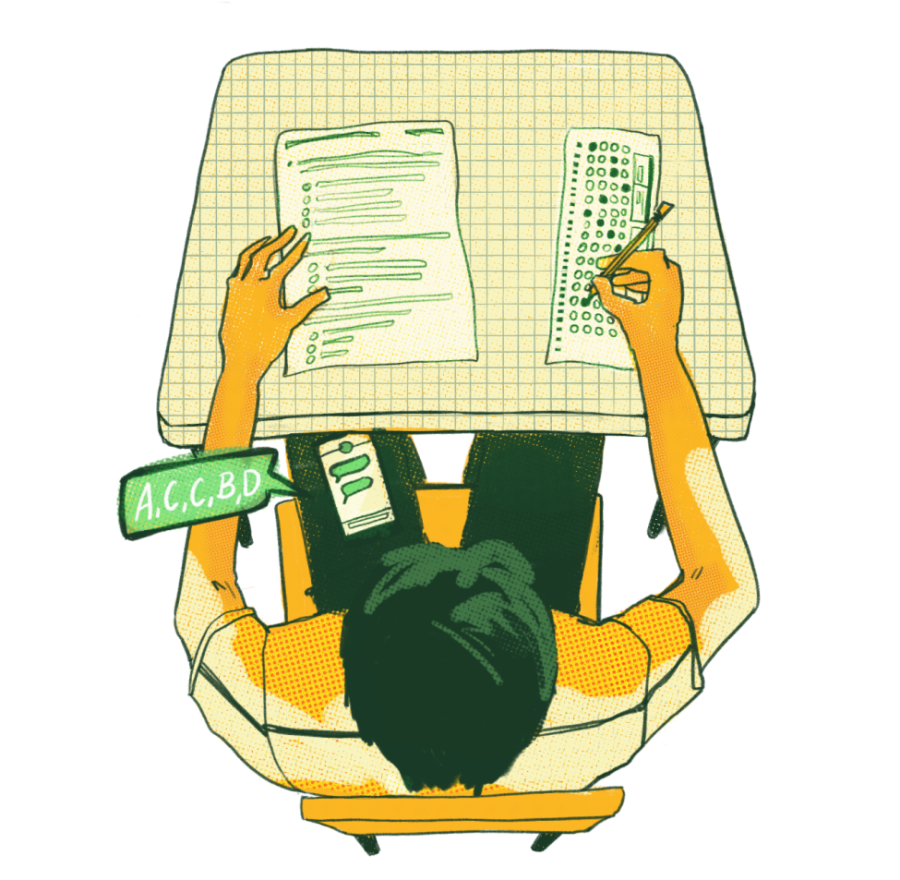Opinion: Are you George Santos 2.0? ChatGPT exacerbates dishonest culture
Art: Palina Kuzmina
When news broke that Congressman George Santos of Long Island had fabricated his resume and work experience during his campaign for office, the story took Americans by surprise.
Many were shocked that Santos was able to get away with such egregious deceits. I was less surprised. To me, Santos’s lies were just a larger version of cheating that is happening all over our country in high school classrooms.
The recent release of artificial intelligence platform ChatGPT could exacerbate the already existing epidemic of academic dishon esty that has plagued our schools for years. A quick Google search on cheating at Palo Alto High School will reveal past academic dishonesty scandals, including a cheating scheme involving up to 30 students across various Honors Chemistry classes last year.
The emergence of new technologies like ChatGPT will only make cheating easier for students. As these new technologies emerge, teachers and administrators will attempt to revise their policies in hopes of catching new forms of cheating. However, it is unlikely that they will be able to keep up.
Ultimately, the solution to our cheating crisis lies within ourselves.
I find that one of the most common given reasons for academic dishonesty at Paly is the pressure many students feel to consistently perform at a high level. However, at some point in everyone’s life, they will be confronted with the temptation to act dishonestly. High pressure environments should never be an excuse for dishonesty.
Furthermore, rampant cheating only aggravates competition by making students feel like they have to cheat to perform at the same level as their cheating peers.
It is important that we all think about the bigger picture here. Issues of dishonesty and cheating extend far beyond a person’s schooling.
Raising kids to be honest increases the likelihood that they will become honest workers and citizens later in life.
A 2009 survey conducted by the Josephson Institute of Ethics found that academic dishonesty in high school leads to lying later in life. Specifically, they found that students who cheat on exams in high school are three times more likely to lie to a customer or inflate an insurance claim than their peers who did not cheat. Those who cheated in high school are also two times more likely to lie to their bosses, and one and a half times more likely to cheat on their taxes.
Recently, we have seen examples of particularly outrageous forms of dishonesty. Just a few weeks ago, Santos was sworn into office amid a growing list of his fabrications, exaggerations and outright lies regarding his education, work experience and much more. Meanwhile, Palo Alto’s own crypto king Sam Bankman-Fried was arrested recently for allegedly defrauding investors and money laundering. Remember Elizabeth Holmes, anyone?
We have to ask ourselves: Where did these individuals learn that cheating and lying was an acceptable way to get ahead?
And what to make of their enablers, who stood idly by, knowing full well that their success was laced with lies?
We are quick to mock the likes of George Santos. We are quick to ask, “how did others let this happen?” We are quick to assume that we would never do such a thing, nor would we allow it to happen on our watch.
However, we might take a look in the mirror first.
Many of my peers say Paly’s competitive culture is the sole reason for cheating. But whose job is it to change our culture? Is it up to us as individuals to foster a less competitive school environment? We can decide to act honestly. We can decide to value honesty, learning and growth even if, arguably, our school does not.
Our individual action can inform greater change. It is up to us to realize that high school cheating is no small matter — in fact, it has real world implications. Ultimately, each of us has to decide for ourselves: Do we want to be honest, law-abiding citizens who lead by example for others? Do we want to be whistleblowers, standing up for a fairer society and holding others accountable? Or do we want to be the George Santos of tomorrow?



